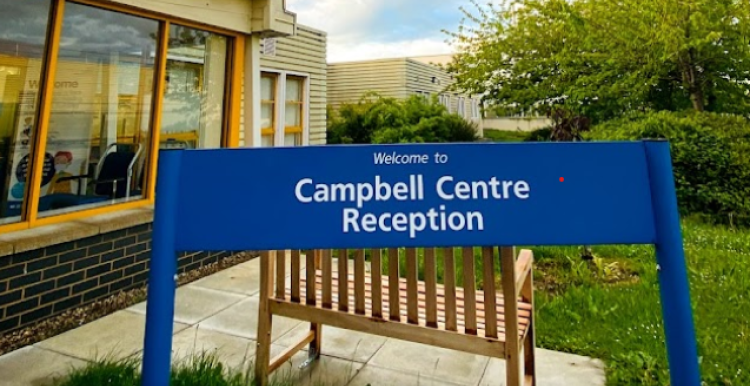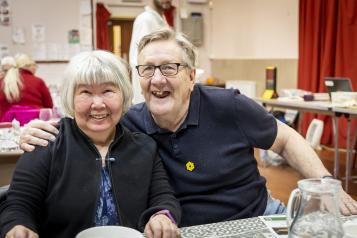Improving life for women on the Campbell Centre’s Willow Ward

The Campbell Centre, Milton Keynes is a 38-bed acute inpatient mental health unit. It has two wards, Hazel Ward and Willow Ward, predominately for working-age adults who need a hospital admission when suffering from a mental health problem.
The wards are staffed 24 hours a day and the team consists of nurses, occupational therapists, doctors, pharmacy staff and domestic staff.
Willow Ward is a women-only unit, with 19 beds for women aged 18-65, including those with learning disabilities and occasionally adolescents aged 16-18. The length of time spent as an inpatient varies for each person.
Women have shared their experiences with us, and thanks to their honesty, the management team have been able to use this feedback to make improvements that have had a big impact on how the women feel about their admission, discharge, safety, and care.
There seems to be more staff about, I feel safe on this admission.
Here are a few of the issues that emerged, and the changes made as a result of our presence on Willow Ward.
The language used by staff when speaking to inpatients
The language used by some staff was unkind. It was dismissive of the women’s experiences and feelings. E.g. ‘they, them and us’, ‘paranoid’, ‘delusional’, ‘attention seeking’, ‘it’s all in your head’ and ‘you’re very unwell’.
What changed?
Over 80% of staff on Willow Ward have now completed Trauma Informed Care training and staff have also completed, or signed up to, Personality Disorder training.
Not enough time spent with inpatients
Women told us they felt staff spent too much time doing paperwork in the office in the evenings which meant not enough staff were on the ward with the patients.
What changed?
Staff now stagger their note writing times so there are more staff on the ward. This allows more time to play cards, board games and generally engage with the women.
No clear plan or support for discharge
Women told us they weren’t given enough information about their discharge plan which left them feeling nervous and anxious about leaving.
What changed?
A newly-recruited Peer Support Worker now leads a dedicated discharge group which has been successful.
Staff not treating women as individuals
Women reported that they felt staff didn’t know how to meet their individual needs when they were unwell or in crisis.
What changed?
A ‘one page profile’ is now clearly displayed in everyone’s bedrooms. Each patient can fill theirs in to say what they need to feel cared for and safe.
Ward rounds are intimidating for inpatients
Women reported that they felt intimidated, overwhelmed and unheard in their ward rounds.
What changed?
Staff developed a ward round session with the Lead Nurse, ‘Preparing for Ward Rounds’ guidance and provided nursing support to get ready.
Nurses have been hearing me so I can open up. We can have one-to-ones in the evenings now and it’s been really good.
Statement on Prevention of Future Deaths report at the Campbell Centre, Milton Keynes
In July 2023, following concerns raised by the Care Quality Commission (CQC) about patient experience and poor staff/patient relationships, CNWL Trust invited us, as an independent, statutory body, to evaluate women’s experiences and make recommendations for improvements.
Our remit was patient/staff communication and relationships, and how the women felt on the Ward. Specifically, do women feel safe, are they treated well, are they aware of their own care plan and discharge?
We were made aware in the national press, of the death of a young woman in January 2024 on the Campbell Centre’s Willow Ward. This occurred six months into our activity period. The coroner for Milton Keynes has issued a Prevention of Future Deaths (PFD) report to Central North West London (CNWL) NHS Trust who run the service. The Coroner’s report is available online (see notes).
Over 12 months, we spent around 170 hours listening to patients. We gathered their honest feedback about life on the Ward, and observed patient and staff interactions. Using a Quality Improvement methodology, we have supported Ward staff to implement evidence-based changes and monitor the impact of those changes on patients.
At the end of our project, patients were telling us that Willow Ward had made progress implementing some of those targeted improvements. This included ways to increase the staff presence on the ward.
However, the recent PFD report demonstrates clearly that critical issues remain around patient safety. These failings must be urgently addressed, and we have already seen significant improvements since this incident took place in January 2024.
We are committed to continuing our work with patients at the Campbell Centre, and supporting the CNWL NHS Trust to deliver change, so that all patients receive the high-level of care and treatment they deserve.
Notes
1. The Campbell Centre is an acute mental health inpatient unit in Milton Keynes. The Willow Ward is a women-only unit for inpatients aged 18-65, and includes those with learning disabilities.
2. The Prevention of Future Deaths report:
3. Our evidence-based recommendations for improvements included:
- Ways to improve communication and staff attitudes.
- Sharing information with patients about their own care plans.
- Better community connections and discharge planning.
- Improvements to the Ward environment.
4. BBC coverage of the story:
https://www.bbc.co.uk/news/articles/c4g4y17gz71o


